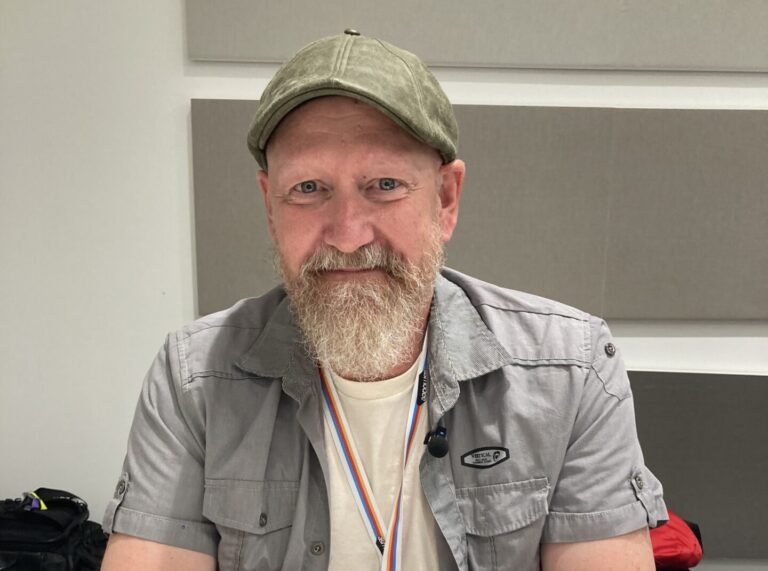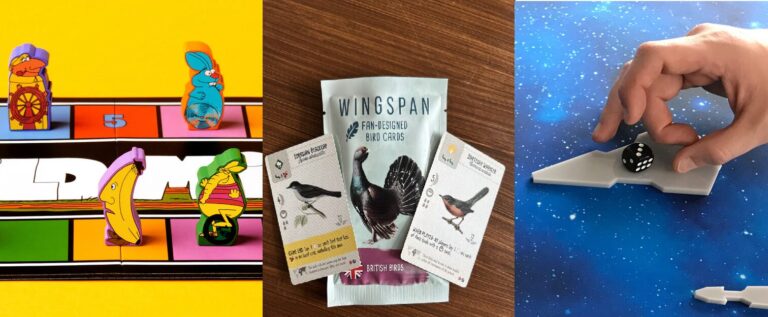
Meet Meeples, the startup using tech to take on Asmodee in board game distribution and fulfillment
Meeples, a full-service supply chain and logistics business focused on the board game market, has rapidly grown from a two-person business being run out of an attic three years ago to a tech-heavy operation about to move into a new 1,400 sq m warehouse. Co-founder and CCO Floris Toorenburg spoke to BoardGameWire about the company’s vision, plans for the future and why he believes publishers are making things unnecessarily difficult for themselves by not choosing a one-stop shop for their logistics.
BoardGameWire: Hi Floris! Let’s start at the beginning – you launched the business about 2.5 years ago out of an attic, I believe? How big was the team at that point, and what line of business were you focused on?
Floris Toorenburg: Originally, Meeples Bordspellen was founded as a boardgame webshop by [Meeples co-founder Rients-Auke Rienstra] in 2019. He came from accountancy and wanted to start his own company – he started this from his own attic. At the same time I launched my first company in 2020, when the pandemic hit. This was also a boardgame webshop named De bordspellenwinkel from my student dorm. I had my first bit of stock in a closet on the hallway.
In 2021 Rients-Auke and I met each other. We were both from a local village called Dronten in the Netherlands, we did not know each other beforehand and after a cold email from me to him we met up. At the beginning, the idea was that I was going to sell my webshop to Rients-Auke and that I would move on to a new business idea. But after the first meeting, where we drank coffee for more then three hours, we figured out there was much more to win here. From there we got all kinds of different ideas which resulted in the merger of our companies in September 2021. In that time we had a small office in the city of Nijmegen in the attic of Rients Auke, with stock in Dronten.

At that time we had a total team of three people: Rients-Auke, Me and Jouke. Jouke was the nephew of Rients-Auke who helped us out with all kinds of tasks. From there we started with our first innovations, we became a dropshipment supplier, the first in Europe with our assortment, and we started the development of our very own conversational chatbot that could help in advising games on webshops. With this the new company, Meeples was launched!
And how has the business changed since then, can you give us a timeline of how it’s grown since?
Since the start of Meeples we have made a huge growth, however our vision still remains the same. We wanted to make the path from production to delivery to consumers and businesses as easy as possible. We wanted to make one infrastructure where everybody could attach to.
In January 2022 we moved to our first very own warehouse, renting a tiny space of about 50 sq m. From here we got our warehouse management software, which allowed us to automate 90% of the work needed to efficiently send packages. From here we knew to the accuracy of about 2cm where a game was located in our warehouse. At the same time we were in the run together with the HAN University of Applied Sciences in Nijmegen for a subsidiary from the government – we got a voucher of €43,000 to research the boardgame industry. Together with the HAN we researched the pain points of local boardgame publishers & retailers. Next to this we took a full look at the business model of boardgames. From this research we learned a lot, and got our first publisher client, Never Be Boardgames, who became a fulfillment and distribution client of ours.
From there we started to slowly develop ourselves: we got our first Dutch publishers, with Keep Exploring Games, we went from 50 sq m in the warehouse to 100 sq m, and in June 2023 we saw that we needed to adapt, because it simply would not fit anymore. From there we rented a new warehouse of 336 sq m. At that moment we were still not sure if our business model would work – we were still developing to make things better, and at that time we had around ten active publishers in our network. I went to the UK Games Expo to pitch our business model to the UK publishers. I landed on Friday morning at 8am, and at 11am I called my co-founder to tell him we were ready for the new warehouse. I pitched our idea to more than 50 publishers, and all were excited. I came home to The Netherlands with 74 business cards and a lot of work to be done.
Since then we have started our partnership with Maersk, which has resulted in us completing our model. We started reaching out to Kickstarters and did our first big Kickstarter with Neo-Morphosis. Around 15 SKUs per package done in the busiest period of the year in December 2023. After we had done that we took the time to further develop ourselves under the radar till June 2024. In this period we had grown to more then 30 publishers worldwide that we work with. We have automated all systems, which results us in being able to get companies VAT registered and fully compliant, and for some companies like the game 911 Operator we take care of the full chain, from factory to the door of the backer. At the same time we launched our own POS system for physical retailers.
In July this year we fully launched our model to the world. Next to this we are about to move into our new warehouse of 1,400 sq m, which shows the growth that we are experiencing. In total we work with a team of seven people now, and a flexible warehouse team.
What made you realise there was an opportunity within board game distribution, and how did you go about learning the market?
What Rients-Auke and I immediately saw was that in the board game industry, innovation finds its place in games, but not in the wider sector. We saw things were still being done inefficiently and that everything was a sole function – there were companies doing retail, or distribution, or production or fulfillment. Almost none were doing it all, or doing it well. When looking at other industries we saw that business chains were integrating, so fewer links and more integration in the different users.

This is where we saw that we needed to be able to do everything, through one vast infrastructure. With our infrastructure we have given the publishers a distributor as well as the possibilities to sell it to anyone they want. It is all automized with their systems, and we even make wholesale platforms for them if needed. We get them VAT registered, which results in them being fully legal. Once the publisher is connected to the Meeples model, they only have to focus on making games and marketing those games. We take care of the boring parts.
You’ve said you see yourselves as “the perfect alternative” to Asmodee – taking on a multibillion-dollar business seems a huge task. What can you do that you believe they can’t?
Yes, our business model is made to give the publisher the freedom to use a distributor, as well sell as much through its own channels. We give the publisher more flexibility and provide a comprehensive network of possibilities. We give the publisher from, for example, Singapore the possibility to sell his or her games to anyone they would like. To the local bookstore, or to the consumer from Croatia. We ship it out.
At the same time we open up our distribution network with an e-mail list of 3,000 retailers all over Europe and the UK, and even bring stock to the conventions they attend. By not becoming dependent on a few distributors we give the publishers the chance to create their own client group and keep a bigger margin for them self. Next to this for the small/indie publishers we put their game in a total package of other small publishers. This way their game gets represented in a lot of games stores, which helps with the outreach. If some of these games sell enough, they may as well buy it directly from the publisher and then we ship it out. It is our goal to work together with the publisher on the success of the games.
You’ve put tech at the heart of the business – in what innovative ways are you using it within distribution and fulfillment, that perhaps others aren’t?
We have many innovation that we use, from our POS system, to our automated product vendors tool, to our damaged goods scanner, our replacement part tool and at last our Self Assessment Form. Our POS system keeps tracks of the sales that have been made in the store of the retailer. This sales/products automatically gets put in a list, by our technology. In this list we put a data analysis in which we track which games will probably also sell in the store. We do this based on more then 30 variables per article and a comprehensive analysis. Then the games with suggestions get pushed into a list, separated by vendor that the retailer is using. Here the retailer can dummy-proof remove or add any game to the list based on the EAN code. Then they only have to click on a button for the order to be pushed automatically into our system.
The package gets shipped out and the next day it is back in stock again at the retailer. This results in a lean method of stock-keeping for the retailer, with stock that actually sells. For the retailer, this time on average saves about eight hours of purchasing per week, and it allows them to keep lower quantities of stock in their store. This is huge benefit. We provide our POS system both with register system and without register system, then we make the connection to your POS platform, for example Woocommerce, Lightspeed, Shopify or Square.

Our idea is to in the end launch our POS system to anywhere in the world, with partners of ours already interested in branding it locally. The idea is to make it lean and fast for the retailers and to 90% automate the purchasing system, with no high costs or needed knowledge of technology. To give some information, the software will be cheap to use, probably around €25 to €75 per month for the retailer. The earning side lays on the distributors. We are currently in the alpha phase of this model, testing it out with two retailers. In September the alpha phase will be done, after this we will integrate it with five other Dutch retailers, and after we have done that we will open the gate and allow different suppliers to connect and retailers from all over the world. We will launch this together with befriended partners from all over the world like Bridge Distribution.
Before we had a wide range of partners in fulfillment & distribution we bought a lot of stock directly from big distributors and publishers. In total we had more then 50 through all of the world. For this we created our automated vendor tool. This system automatically looks at the different suppliers, see if they have stock and whoever is the cheapest. This allowed us to smartly purchase stock from our suppliers and to also look at new stock when requested by clients.
As with any company, chances are that some games will be damaged. It used to be close to impossible to earn your money back from these games, without spending a lot of time manually uploading this. Next to this it was hard to find these or to integrate damaged products in a system of automation and fulfillment. For this we created our damaged goods scanner. This automated the whole process which allows us to upload damaged goods, with their own unique barcode on our warehouse within two minutes. This gave the damaged goods a second life and allows publishers, or us, to sell it again.
One of the other most difficult things to handle are replacement parts. This takes a lot of time for both publisher and fulfillment house. We have created a new model behind this that closely automates this whole process with the use of a simple form and replacement packages. The only thing that the publisher has to do is to approve the replacement request of their client and the rest is handled by us.
Lastly, we created a self assessment form to help publishers in the process of testing the game to bring it to the market. This is a question based form of 20 questions that anybody can fill in. After this 20 questions the user gets an automated report on their situation, with tips and tricks that could help them out. This is our way to also help people who are interested in starting something in the industry, but who are not far enough to distribute or fulfill.
You’ve signed up with Maersk as a shipping partner, who are obviously a huge player in the industry. What advantages does that give you?
Maersk is for us more than just a shipping partner. We have found each other on a deeper level and have committed to together finish this project of ours. Besides having them for our shipments, from containers to parcels we are working with Maersk on solution for Norway and Switzerland to make shipments always friendly to there as well. Besides this we are working on something new with Maersk for the Oceania, Asia and Africa markets. We see Maersk as our partner and they actively think with us to further integrate and automize the boardgame industry.
What do you see as the main challenges for designers and publishers currently, in terms of distribution and fulfillment?
Publishers and designers are making the process to difficult for them self by choosing not 100% solutions. A lot of times we hear that publishers think it is difficult to sell in Europe, especially with all the taxes. In reality it is really easy, but made difficult by companies doing the VAT. Once you are VAT registered, we can automize it and then the whole tax side costs you one hour per quarter in the year. It is not hard, and for a simple one-time fee of €1,000 we get is arranged for you.
The main goal for publishers should be to minimize and automate their infrastructure as much as possible. The only thing the publisher should focus on is making games and marketing these games. The rest of this should be outsourced to companies like ours. As long as publishers do this, they keep their costs low which allows them to easier make a profit.
And what are the biggest mistakes you see people making when approaching fulfillment and distribution?
Generally speaking, we see that many people have no clue how it works when it comes to distribution and fulfillment. Which makes sense: a lot of designers and publishers like to make games, what happens is that they get pushed into the managerial role, instead of the designers role. Most of the times this happened, because they work with to much companies, who only do a small part which results in systems not integrating on the right way with each other. The solutions for this are most of the time easy.

Another thing we hear is publishers saying they only do a Kickstarter, because it is too much work to do e-commerce sales. This is always a pity, because it is easy to set this up! One shopify website plus some overstock allows these publishers to keep on selling. Simply find the one-fit solution, allow them to automize and standardize your system and then let the flow do the flow. If you allow a company, like us to do this for you we can for 95% automize the whole order flow for both retailers and consumers for the publisher. We do the same with the purchasing process of the retailers.
For us the main goal is to help the publisher and the retailer, which results in the consumer finding the right games. We build the infrastructure from the backend in the shadows, while the publishers and retailers shine.
How are the currently rising sea freight prices having an impact on the board game industry?
It has been a struggle. Especially since, what we see and hear that it is a bubble. The Red Sea situation, together with bad weather in Asia and a rush of panic by Christmas present suppliers has resulted in absolute chaos on the container market.
At the same time, shippers are using this to get huge margins. For us, we have seen container prices risen in February from $2,500 to now $11,000, even with contracts. When looking at the economic numbers of our retailers, our publishers, our own channels and the sales by partners from different sectors like furniture and day to day goods we see that the market is in a slump right now. So there is no market demand, that justifies the current numbers. So we suspect the container prices to rapidly go down again in the upcoming months. Especially when the Christmas sector has also cooled down again. For the current projects that we fulfill, we see some publishers that have issues here, however most of the time it will not cause too many issues. A board game has a relative high value for the size it takes. This would be different with, for example, laundry baskets.
What about manufacturing, have things normalised again post-Covid-19, or is there still a workload backlog / elevated prices?
When I look at the production side of things it is normal and I see that there many suppliers that are fighting for orders. In my personal opinion it is overflowing with the amount of companies that can produce. We have a few that we use normally and the prices are very good – it is impossible to produce in Europe for these prices. The lead time from China is long, from approving files to delivery in the Netherlands is about five months at the moment, while producing in Europe takes about 1.5 months in total. We see order quantities becoming smaller and publishers working more together now
to consolidate.
What do you see as the biggest opportunities and risks within board games fulfillment and distribution over the rest of the year, and into 2025?
For us the biggest opportunity is to automize all the systems and to arrange the VAT. The way how it is being done at the moment, is simply not the right way. Because the board game industry is relatively small, most of the times the government, simply does not care or do not think it is worth to investigate. Everybody would like to do it the right way, however they almost never know how it works. Even fulfillment houses don’t. I believe with our new POS system in combination with our fulfillment and distribution services we can become one of the bigger players within a few years. We have already managed to come so far, with no investors within three years, by generally making the process easier and helping everybody involved we can make a huge influence.
And let me add one more note: we do not say that you should not use the traditional distributors like Asmodee, we only say you should think about the process before that and the total picture. Use multiple vendors, and supply them from one hub where you are fully operational and legal. By letting us do that you can only focus on what you do best, making the best games.
Not only our main risk, but also these of retailers and publishers, are the economy slowing down further. We see publishers quitting the market because it hard for them to survive. This even more shows the importances of simplifying the business and making them as lean as possible. For us the main goal is to get as much publishers as we can get, both small and big to fill our model further. We currently have about 30 publishers in our network from all over the world and by the end of the year we hope to bring this to 75.







I’m curious if you asked Floris about naming his company Meeple, given the issues surrounding the European trademark of the term by Hans Im Gluck.
I did! HiG has never contacted them about it, or vice versa.
[…] new warehouse has five-times more capacity than the 1,400 sq m building it moved into towards the end of 2024 – itself a significant upgrade from the 300 sq m warehouse it had worked from […]